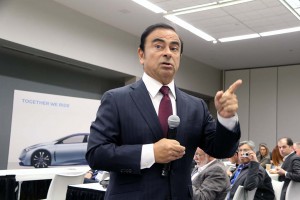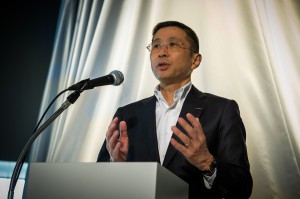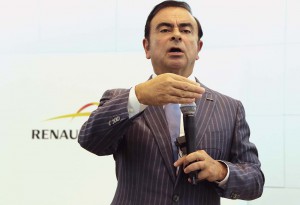After languishing in the Tokyo Detention Centre for nearly three weeks, facing regular grilling by Japanese prosecutors, ousted Nissan Chairman Carlos Ghosn is expected to be formally indicted on Monday, the Nikkei business daily is reporting.
Ghosn and Nissan board member Greg Kelly were arrested nearly three weeks ago as they flew into Japan, authorities responding to a report by the second-largest Japanese automaker that alleged the pair engaged in financial misconduct. Ghosn, in particular, allegedly failed to report millions of dollars in income while also misappropriating Nissan funds, among other things, to purchase homes in Rio de Janeiro and Beirut. He is Lebanese by heritage but grew up in Brazil.
The Nov. 19 arrests, which marked the downfall of one of the industry’s most powerful executives, have stunned the automotive community. They have also generated a number of questions about why Ghosn was taken into custody and put in the position of possibly serving a decade in prison, rather than simply facing civil penalties. Some observers have suggested he may be an unwitting pawn in a battle for control between Nissan and the French automaker Renault which rescued the then-failing Japanese automaker in 1999.
Under Japanese law, authorities have been allowed to hold Ghosn and Kelly in custody while investigating allegations Nissan said were first raised by a “whistleblower.” The rules say a suspect can be held in custody for up to 10 days without charges, but prosecutors have been able to extend that while working through the case for another 10 days. By Monday, they would need to bring formal charges, release Ghosn and Kelly or seek another extension from a Japanese judge.
According to the Nikkei, Ghosn will be indicted for allegedly underreporting millions of dollars in income on five of Nissan’s annual reports through the fiscal year ending in March 2015. All told, the investigators appear ready to argue that he reported only half of the 10 billion yen, or $89 million, he earned during that period. And authorities are said to be looking at leveling additional charged covering the three years since then.
(Ghosn may ring in the new year in Japanese custody. Click Here for the story.)
It is unclear whether Ghosn also will be indicted for misuse of corporate funds for the purchase of those homes and other personal expenses.
Shortly after Ghosn was arrested, Nissan CEO Hiroto Saikawa held a news conference in which he declared himself “angry” over the alleged corruption which, he noted, was uncovered after an internal study triggered by a “whistleblower.”
But Nissan itself could be in trouble, the Japanese newspaper noting that the automaker could also be held responsible for any false statements made in its annual report.
That echoes concerns raised by a number of observers, both in and outside of Nissan, who question how such alleged high-level corruption could have gone undetected, especially for such a long period. Pay for a ranking executive – Ghosn serving most of the past 20 years as Nissan CEO – must be approved by the corporate board, and major expenses typically leave a paper trail that, at the least, company accounts would have to be aware of.
The treatment of Ghosn and Kelly “seems pretty harsh when it involves a major corporate executive who has been credited with saving the company, and another board member, it just seems strange,” said Aubrey Harwell, who is serving as the U.S. attorney for Greg Kelly, a long-time Nissan employee who was serving as an outside director when arrested.
(Click Here for more about how Ghosn scandal could fracture Renault-Nissan Alliance.)
“It’s a coup,” analyst George Peterson of AutoPacific Inc., said more bluntly.
Ghosn was working for Renault in the late 1990s, earning a reputation as a miracle worker for having helped the French company reverse its financial decline. He was sent to Japan in 1999 to oversee Nissan’s revival initiated by a $6 billion Renault investment. Ghosn initially served as Nissan’s Chief Operating officer but was subsequently elevated to CEO. He then took on additional roles as chief executive at Renault and head of the umbrella Renault-Nissan Alliance.
Two years ago, Ghosn authorized Nissan to take a controlling stake in the failing Mitsubishi Motors, appointing himself chairman. He relinquished day-to-day management of Nissan to focus on the new acquisition, Saikawa becoming the bigger carmaker’s chief executive.
Within days of his arrest, Ghosn was stripped of his two Japanese management titles – though he remains on both the Nissan and Mitsubishi boards pending a vote by shareholders to remove him. Meanwhile, he has only been temporarily removed as Renault CEO and still officially leads what is now the Renault-Nissan-Mitsubishi Alliance.
Skeptics like Peterson have questioned whether the entire affair was triggered by Nissan’s desire to shake loose of Renault’s grip. The French company holds a 43.4% stake in its Japanese partner and can appoint board members and senior executives at will, while also naming the head of the Alliance.
(To read more about Ghosn’s detention, Click Here.)
Those were among the issues that observers believe were raised during a meeting of the Alliance’s top officials in Amsterdam last week, though no specific details were announced publicly.



